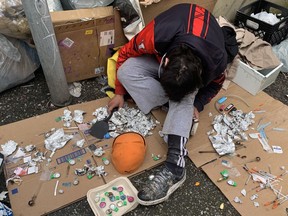Experts warn that forced care can be counterproductive. Eby says he consults extensively first

Repeat overdoses seek treatment rather than discharge It should, even if it means involuntary care, says B.C. NDP Leader Candidate David Eby.
However, this idea worried theaddiction guru, a doctor and researcher, that such an approach would not be beneficial.
"Someone overdosed twice in one day, and when they showed up to the emergency room for the second time, they overdosed on the same day." The idea that if there was a second overdose, the person would be put back in the street, and a third overdose would kill him, or he would suffer severe brain damage, or go back to the emergency room again. It just seems very strange," Eby, who toured the Okanagan as part of a leadership campaign, told Post Media News. can only be done in cases of severe brain damage from an overdose. care may and should be included.”
Eby noted that people facing long waits to enter detox and support facilities Acknowledged gaps in the addiction treatment system.
"But for some people, [seeking treatment] never happens, so we have to do our best to give them a chance to survive." The approach is similar to the controversial Bill 22 introduced by the NDP in 2020. The bill required the young man to undergo her seven-day treatment after an overdose.
The plan was scrapped inMay,after backlash from indigenous groups and representatives of children and youth.
Dr. Paxton Bach, BC Joint Medical Director. According to the Center for Substance Use, currently involuntary admissions are to Capacity to to decisions for themselves.
An addiction medicine physician who works daily with addicts at St. It is ineffective and may do more harm than good.
This is because people who are involuntarily treated are at increased risk of overdosing if they relapse after being released due to loss of tolerance to the drug. Detaining someone unintentionally often inflicts psychological trauma and physical coercion that could discourage that person from seeking emergency medical care in the future, he said.
"The bottom line is that you can't force people into treatment. We have to really do the hard work of building a system that provides care.”
Director of the Vancouver Area Network of Drug Users (VANDU) John Braithwaite has a problem with therapy that deprives him of personal choice.
"Once you start down that pass, that can get of kind Dark
Brittany Graham, Executive Director of VANDU stated that it is counter-intuitive to force patients to seek treatment at their worst, a system in which patients who voluntarily seek treatment often face waits of two to five weeks.
BC Green MLA Adam Olsen said that systems involving involuntary care need to be informed by the best research and extensive consultation.
"We will have to make sure that the culture of service does not further stigmatize and lead to further marginalization of the population." said Olsen, a member of the Tsartlip First Nation.
Eby acknowledged that involuntary parenting was a "very important issue", particularly the state's treatment of Indigenous peoples and the treatment of children in foster care.
"Not a great record. So any kind of movement in that direction should be done very carefully. But death from an overdose."
Public consultation on Bill 22 and involuntary treatment was not enough, says Eby. He said something would change if he became prime minister.
"Part of our solution is to help people with serious mental health and addiction but we have no interest in repeating the mistakes of the past.”
BC In 2016 B.C. Since the declaration, more than 10,000 lives have been lost due to illegal drug deaths.
In the first half of 2022, 1,095 British Columbians died from accidental overdoses. This is the highest recorded in his first six months. Any calendar year. That's his average of six deaths per day, said chief medical examiner Lisa Lapointe.
Eby, who resigned as Attorney General and Housing Minister to run to replace Prime Minister John Horgan, is being challenged by climate activist Anjali Apadurai. Appadurai did not respond to a request for comment on the overdose issue.
kderosa@postmedia.com

Sign up to receive daily headline news from the Vancouver Sun. A division of Postmedia Network Inc.
Thank you for registering.
Sending welcome email. If you don't see it, please check your spam folder.
The next issue of Vancouver Sun Headline News will arrive in your inbox shortly.


